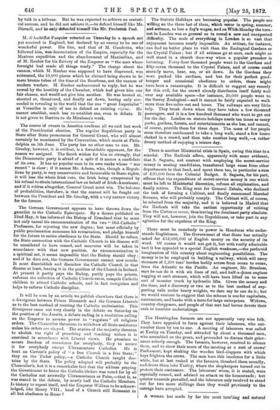The Statute Holidays are becoming popular. The people are willing
on the three last of them, sthich -mow in spring, summer, and autumn, to lose a daes wages, luid on Whit-Monday the turn- out in London was so genteel as to reveille new and unexpected difficulty. The scale of everything in London is so vast that enjoyment becomes nearly impossible. An artisan, for instance, can find no better place to visit than the Zoological Gardens or the Crystal Palace ; but if all artisans go at once, each might as well stand in a church door-way when a popular preacher is lecturing. Forty-four thousand people went to the Gardens and fifty-seven thousand to the Crystal Palace, and of course could scarcely move, hear, see, or sit down. In the Gardens they were packed like sardines, and but for their perfect good- temper and occasional obedience to orders, there might.- have been a catastrophe. It is difficult to suggest any remedy for this evil, for the crowd already distributes itself fairly well over any available space—for instance, 30,000 people went to. the Surrey Zoological—and it cannot be fairly expected to walk more than five miles out and home. The railways are very little help. They break down when they have taken a few thousand passengers, and it is a few hundred thousand who want to get out for the day. London on statute holidays needs ten times as many parks, gardens, forests, and entertainments as she has, and cannot, of course, provide them for three days. The mass of her people seem therefore condemned to take a long walk, stand a few hours choked in a crowd, and then take another long walk,—a rather- dreary method of enjoying a leisure day.


































 Previous page
Previous page